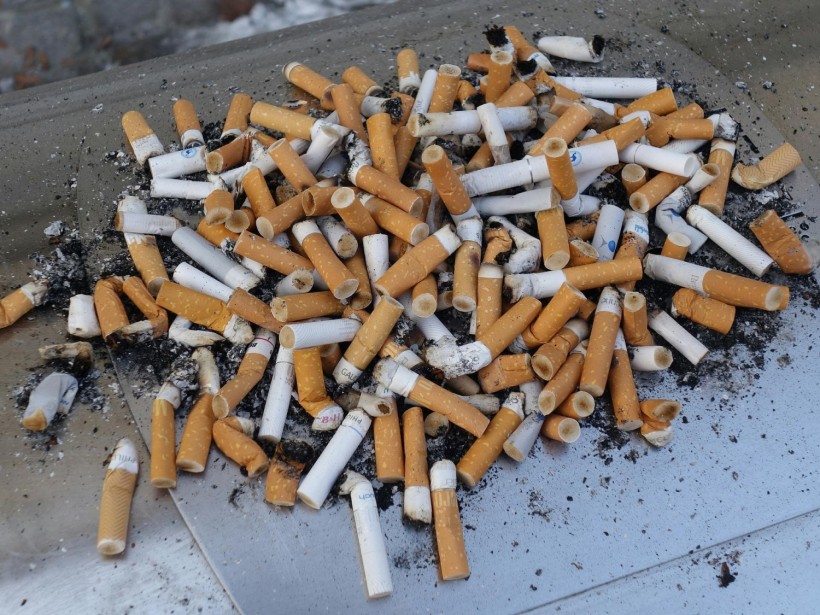According to a study participated by the UN, an estimated 4.5 tons of tobacco filters are discarded annually, and many of them wind up in the water with fatal results.

Cigarette Butt Pollution
Many small, light-weight butts are thrown into streets, parks, or beaches, sometimes blown into bodies of water by storm water systems.
According to Kari Martin of Clean Ocean Action in New Jersey, few people are aware of their enduring and potentially catastrophic impacts on marine habitats.
Disturbing Photo Shows a Black Skimmer Feeding a Cigarette Butt to Its Chick https://t.co/DfSY6T05vZ #audubonsociety #nature #birding #birds #audubon #earth pic.twitter.com/m6nIJqQUZ9
— istockhistory (@istockhistory) August 2, 2019
It contributes to the plastic problem, Martin added via ScienceDirect. "Many people are unaware that the actual cigarette filters are comprised of plastic fibers."
Tough Waste
Despite being little and often invisible, cigarette butts are present practically everywhere, according to Earth Day.
Contrary to popular opinion, cigarette butts are not innocuous.
They are constructed of the artificial plastic substance called cellulose acetate and are loaded with dangerous chemicals.
While the plastic portion of cigarette butts or filters can take up to 10 years to deteriorate, the chemicals they emit can linger in the environment for many more years after the butt has stopped functioning.
These plastic filters comprise cellulose acetate and make up more than 90% of commercial cigarettes.
Plastics photodegrade, which means that light breaks them down into tiny bits, but they don't finally disappear; rather than decompose over time, according to Martin.
Nothing can be done to stop this plastic debris and microplastic from ending up as animal food when transported along waterways and beaches.
Martin cited a photograph taken on a Florida beach in 2019 that showed a Black Skimmer carefully feeding a cigarette butt to its chick, saying, "The cigarette butts themselves look like small fish."
Also Read: Microplastics Found in Farm Animals' Blood, Meat, and Milk, Should Consumers Start Worrying?
Harmful Toxins

Cigarette butts stand out as a particularly harmful kind of waste in an ocean overflowing with plastic trash, according to Mitch Silverstein, the policy coordinator for the San Diego branch of the ocean conservation organization Surfrider.
The world's most-littered thing, according to Silverstein, is them.
They are composed of non-biodegradable plastic and are loaded with dangerous garbage, which is bad for the environment and the sea.
More than 7,000 known compounds have been found in tobacco smoke, including at least 70 known to cause cancer in humans and animals.
The World Health Organization (WHO) is one group that has long issued warnings about the potential effects that these substances may have on marine life.
The organization stated in a 2017 study that "this poisonous trash ends up on our streets, in our drains, and our water."
According to research, aquatic species can become highly toxic when exposed to hazardous substances, including nicotine, arsenic, and heavy metals leached from discarded butts.
Possible Long-Term Effect
Others have looked at the longer-term consequences of the chemicals in cigarette butts and discovered that freshwater rainbow trout lost weight after 28 days of exposure while Mediterranean mussels absorbed 22 compounds, some of which were deemed potentially hazardous to humans or other animals.
The findings suggested that this frequently disregarded waste product may have wide-ranging effects on individuals who consume seafood products and those who depend on fishing for their living.
According to Silverstein, humans are at the top of the food chain, but despite our inherent intellect, we contaminate the ocean and then rely on it for food.
Related Article: Fear of Cancer Rises Among Residents of Areas Polluted by Forever Chemicals in the US
For similar news, don't forget to follow Nature World News!
© 2024 NatureWorldNews.com All rights reserved. Do not reproduce without permission.

![Tsunami Hazard Zones: New US Map Shows Places at Risk of Flooding and Tsunamis Amid Rising Sea Levels [NOAA]](https://1471793142.rsc.cdn77.org/data/thumbs/full/70325/280/157/50/40/tsunami-hazard-zones-new-us-map-shows-places-at-risk-of-flooding-and-tsunamis-amid-rising-sea-levels-noaa.jpg)



